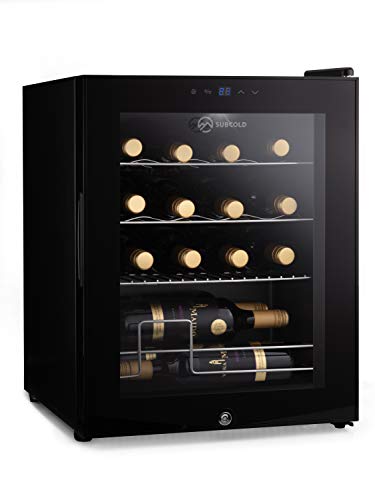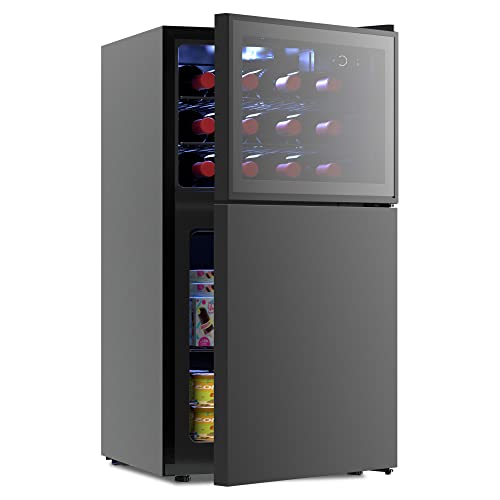Wine Cooler: A Simple Definition
페이지 정보

본문
 What Is a Wine Cooler?
What Is a Wine Cooler? Wine coolers are an excellent device to keep your favourite wine at the proper temperature. They also reduce the amount of vibration that could affect the aging and preservation process.
Wine coolers are an excellent device to keep your favourite wine at the proper temperature. They also reduce the amount of vibration that could affect the aging and preservation process.Think about features that will satisfy your collection's current and future needs. Consider the bottle capacity to ensure you have enough bottles.
Capacity of the bottle
A cooler is the Best Rated Wine Fridge option for those who plan to store wine for a long time. They can accommodate many bottles and keep them at the right serving temperature, but they are not designed for optimal aging conditions. However they will help keep your wines at an appropriate temperature and will prevent unwanted vibrations that can cause the wine's sediment to kick up.
Different types of wines require different storage conditions. For instance when you store your wine in temperatures that are too hot, it could develop an unpleasant cooked flavor when stored in temperatures that are too cold can cause the cork to freeze, which could damage the bottle. A wine cooler is an ideal solution to these issues, as it will protect your wine from heat, sunlight, and humidity.
These appliances can be installed into kitchen cabinets, or even as a Under counter Wine fridge UK-top to give your home a sleek and seamless appearance. They are also energy-efficient, since they use less power than compressor fridges. Thermoelectric fridges make use of the Peltier Effect, which is a phenomenon involving the transfer of heat from two electrical junctions. In the end, they use less electricity than compressor-based wine fridges and can be used in small areas.
In addition to wine These units can also be used to store cooled beer as well as other alcohol-based beverages. Because the size of these bottles varies, it is important to know their dimensions before you buy them and choose a wine refrigerator undercounter storage system that is able to accommodate the bottles. In addition, it is important to think about the shape of the bottles you like. Some bottles are cylindrical, whereas others are rectangular and oval.
Temperature control
A wine cooler is a refrigerator which keeps wine at an ideal temperature. This helps preserve of the wine's natural flavor and aroma. The cooling system inside the wine refrigerator could be either thermoelectric or compressor-based. Some models also have humidification features that help maintain the correct humidity level in the wine cellar. This stops the corks from drying, and the wine from oxidizing. Some wine refrigerators come with an air-flow fan that distributes the air evenly to ensure a consistent temperature throughout the cabinet.
Certain wine coolers feature an analog or digital display that displays the current temperature inside the refrigerator. The displayed temperature may differ from the actual temperature due to various factors, including the air circulation, compressor noise and vortices that are created when the door is open. The evaporator coils may also get frosted if the evaporator coils aren't regularly defrosted. If you notice a frozen-over coil in the evaporator, test the thermistor and heater for continuity using the multimeter.
The ideal temperature for storing and serving wine is between 45 and 65 degrees. It is essential to keep wine at a certain temp because different types of wine require a specific amount of heat to keep their color and smell. If you keep white wine at a high temperature, it will develop a cooked taste that isn't appealing. Red wine will lose its rich aromas and flavors if it is stored at a lower temperature.
A wine cooler isn't only used for wine storage but can also be used for storing cans and bottles of beer, soda and other non-alcoholic beverages. It is available in different sizes and can be installed or freestanding.
Energy efficiency
Wine coolers are designed to keep wine at a particular temperature and humidity level. This is essential to preserve the flavors and aromas of your wine for many years to come, and not lose its quality. They also reduce exposure to vibrations and sunlight, which can affect the process of aging. Many wine coolers carry Energy Star certification, which means they meet the strictest energy-saving standards.
The energy consumption of a wine cooler will differ based on various variables, such as the temperature of the room, the usage and storage conditions. However, on average, wine coolers consume 85 watts per hour. This is relatively low in comparison to other appliances in the home. Wine coolers are a great alternative for those looking to save money each month on their energy bills, while still enjoying the convenience and luxury of keeping their favourite bottles in optimal condition.
The efficiency of your wine cooler will be affected by the use of compressor technology or thermoelectric technology. The thermoelectric cooler makes use of electric current to create temperature variations between the inside and outside of the refrigerator. The cooled air is then circulated by the fan. This type of wine fridge typically requires a greater initial investment than compressor models, but can also offer better energy efficiency over the long term.
To improve the energy efficiency of your wine refrigerator, ensure that it is properly insulated and located in a well-ventilated space away from direct sunlight and heat sources such as stoves or radiators. Be sure that the cooler has enough space around it to allow air to circulate. If your wine cooler has coils in the back, be sure to clean them regularly with a brush or cloth to remove any dust.
UV protection
Each wine cellar cooler should include UV protection. It shields bottles from harmful UV light that can cause premature aging of the wine and alter its taste. A quality wine & beverage refrigerator refrigerator will include dark tinted glass doors or solid doors to block all sunlight and UV light.
UV radiation can also damage the polymers and dyes in the bottle, causing them to degrade. This could cause the corks to become damaged and lead to oxidation and taste loss. UV radiation can also accelerate the chemical reactions that occur in a wine bottle, causing it to age more quickly and lose its aromas and flavours. Wine coolers are a great option, as they provide superior UV protection, which is ideal for preserving your wine bottles and protecting your precious investment.
The choice of the best home wine fridge wine cooler depends on your wine storage needs and location. The ideal temperature for wine storage is 55degF, and wine coolers keep your wine within this temperature range. They also regulate humidity levels to avoid moisture that can cause mildew and mold. A quality wine cooler can also prevent unwanted vibrations which could disturb the sediment in older bottles, destroying their taste.
The top wine fridges come with shelves that can display your most loved and most cherished bottles of wine. They also have charcoal filters that eliminate smells and humidity control that is automatic. Many wine coolers even have alarms that notify you when the doors are opened.
Vibration reduction
A wine cooler is a special appliance that holds bottles of wine at an optimal temperature for maturing and enjoying. Certain models have advanced features to enhance your storage experience, such as UV protection, vibration reduction, and humidity control. These features ensure that your wine develops its full flavors and characteristics over time.
Vibration reduction is a crucial aspect of wine coolers as excessive movement can disrupt the sediment and interfere with aging. Research has shown that vibrations can affect the flavor of wine by reducing its propanol and isoamyl alcohol levels [55. It is therefore important to keep your wine cooler away from other appliances with moving parts, for example washing machines or tumble dryers.
Wine Coolers that use vibration reduction technology have an absorption system. This reduces noise and vibrations. They come with one side of a Peltier module that absorbs heat from the inside of the refrigerator, while the other side releases the absorbed heat to the surrounding environment. This reduces the vibration and noise generated by the compressor-based wine cooler.
Some wine coolers can be noisy, particularly during the initial use. It can disrupt your everyday life therefore it is essential to take into consideration the noise level before purchasing a wine refrigerator. You should look for wine coolers with low levels of 40 decibels or less to avoid disturbances.
When choosing a wine refrigerator, you should also consider the energy efficiency. The latest models are built with eco-friendly insulation improvements and low-energy compressors that help save energy. This feature can reduce your energy consumption by as much as 50%, thereby saving money in the long run.
- 이전글One Jaguar Car Key Cover Success Story You'll Never Be Able To 24.09.14
- 다음글20 Best Tweets Of All Time About Integral Fridge Freezer 24.09.14
댓글목록
등록된 댓글이 없습니다.

